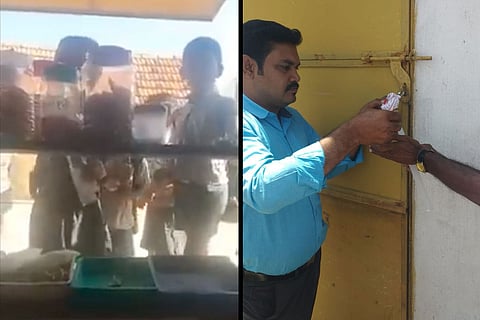

After two men were arrested for denying sweets to children belonging to Scheduled Castes in Tamil Nadu’s Tenkasi, the police invoked an externment provision of the SC/ST (Prevention of) Atrocities Act against the two on Sunday, September 18. With this, the accused have been prohibited from entering the village of Panchakulam, where the incident occured. The incident came amid a larger social boycott of the Paraiyar community, which is a Scheduled Caste, by the dominant Yadava community in the area, after a tussle between the two groups regarding withdrawing of police cases. It is to be noted that originally a case was filed invoking the SC/ST (PoA) Act and then a counter FIR was filed, which is a common occurrence when PoA cases are filed against a dominant community.
The order was passed by South Zone Inspector General of Police Asra Garg to prevent such atrocities in the future. A video of a shopkeeper denying snacks to school children belonging to SC communities went viral on social media on Saturday, following which the shop was sealed by officials and two persons arrested. Externment refers to the act of prohibiting people from residing or entering a specific area or locality up to a certain time. However, the police have not specified the amount of time the externment will apply to the two accused in this case.
As per the video, the shopkeeper Maheshwaran used casteist slurs against the school children and asked them not to come back to the shop. The Karivalamvanthanallur (KV Nallur) police arrested him as well as Ramachandran alias Murthy in connection with the case, and booked them under Section 153(A) (promoting enmity between different groups on grounds of religion, race, place of birth, residence, language, etc., and doing acts prejudicial to maintenance of harmony) of the Indian Penal Code.
Speaking to TNM, IGP Asra Garg said, “We have decided to invoke the externment provision to ensure such incidents are not repeated. The provisions are available in the SC/ST (PoA) Act and are invoked after looking into the merits of the case. This is being done to send across a message that atrocities against members belonging to Schedule Caste and Schedule Tribe communities is a punishable offence.” In this regard, sections 3(1)(r), 3(1)(s), 3(1)(u),3(1)(za)D, 3(1)(zc) of the SC/ST Act have been invoked. Section 3 of the SC/ST(PoA) Act deals with punishments for offences/atrocities against a member of SC or ST community by a member not belonging to the community.
The video shows the school children waiting in front of Maheshwaran’s shop to buy some snacks. However, their disappointment is apparent after the shopkeeper tells them that the village residents have decided not to sell anything to the people from “your street”, alluding to a section of the residential area in which they live. Maheshwaran runs a small shop near the Government Adi Dravidar Welfare School, and the school kids apparently often used to approach his shop for snacks. This time, however, he asked the kids to tell his parents about this decision taken by the village. “Hereafter, you should not go to the shops located in the village... Leave... Go to school... Tell your parents that you cannot get the provisions here,” he is seen telling the students in the video.
During an earlier fight between the two communities, people from both the Paraiyar and Yadava groups had ended up filing cases against the people of the other caste. A few days ago, a Yadava man named Ramachandran approached the Paraiyars, asking them to withdraw the complaint against him, since he had been selected for a government job and a police case against him would have been a hindrance. The people of the SC community responded by saying that they were ready to withdraw the complaints, but only if the Yadavas withdrew the case against them as well. The latter, however, eventually refused to do so. They then took up the issue with the local caste panchayat, an illegal system, and decided to implement an economic boycott of the SC communities in the village. The Supreme Court in 2018 declared the assembly of caste/community or khap phanchayats illegal, but the practise continues in many parts of the country.
In the Tenkasi untouchability case an important clause on socio-economic boycott had been invoked .This will be the first in Tamilnadu.Thanks to all activists ,especially Evidence Kadhir and team who have been fighting for the SC/ST act to be invoked in this case from yesterday pic.twitter.com/RXaiLYDiqp
— Shalin Maria Lawrence (@TheBluePen25) September 18, 2022